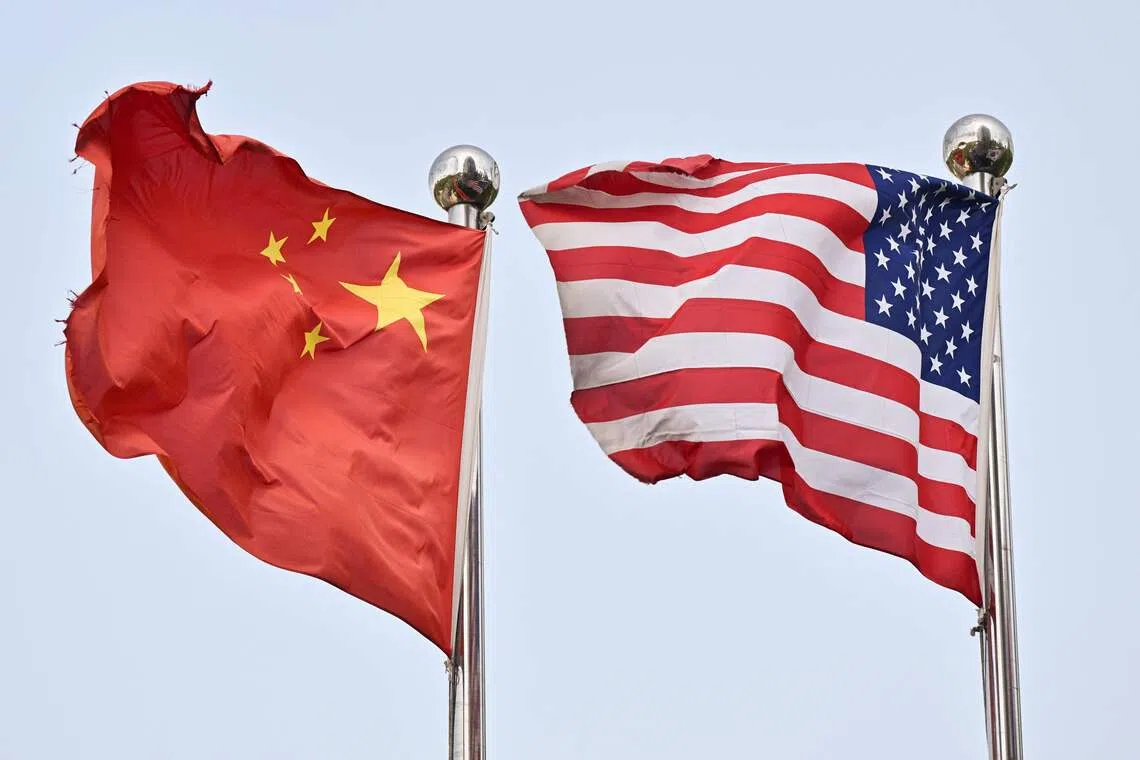Beijing blames US for raising trade tensions, defends rare earth curbs
Sign up now: Get insights on Asia's fast-moving developments

China's Commerce Ministry said its export controls on rare earth elements followed a series of US measures since bilateral trade talks in September.
PHOTO: AFP
BEIJING/HONG KONG – China called US President Donald Trump’s latest tariffs on Chinese goods
Mr Trump on Oct 10 responded to Beijing’s most recent export controls by imposing additional tariffs of 100 per cent on China’s US-bound exports, along with new export controls on critical software by Nov 1.
The revived trade tensions have rattled Wall Street, sending Big Tech shares tumbling, worried foreign companies dependent on China’s production of processed rare earths and rare earth magnets, and could derail a summit between Mr Trump and Chinese President Xi Jinping tentatively scheduled for later in October.
Responding to Trump
The Chinese Commerce Ministry’s statement on Oct 12 was Beijing’s first direct response to Mr Trump’s lengthy Truth Social post on Oct 10, where he accused Beijing of suddenly raising trade tensions after an uneasy truce was reached six months ago between the world’s two-largest economies, allowing them to trade goods without sky-high tariff rates.
“Our relationship with China over the past six months has been a very good one, thereby making this move on trade an even more surprising one,” Mr Trump said.
The Commerce Ministry said in an equally lengthy statement that its export controls on rare earth elements followed a series of US measures since bilateral trade talks in Madrid in September.
Beijing cited the addition of Chinese companies to a US trade blacklist and Washington’s imposition of port fees on China-linked ships as examples.
“The US actions have severely harmed China’s interests and undermined the atmosphere for bilateral economic and trade talks, and China is resolutely opposed to them,” the ministry said.
Beijing stopped short of explicitly connecting these US actions to its export curbs on rare earth elements, saying its curbs were motivated by concern about these materials’ military applications at a time of “frequent military conflicts”.
It also held off on announcing a corresponding levy on China-bound US imports, unlike earlier in 2025, when both superpowers progressively ratcheted up tariffs on each other until the US rate was 145 per cent while China’s was 125 per cent.
Path for negotiations
China’s decision not to immediately respond in kind to Mr Trump’s opening salvo in this latest round of trade tensions could leave the door open for both countries to negotiate a de-escalation, analysts said.
“By clarifying the rationale behind its retaliatory measures, Beijing is also outlining a potential path forward for negotiations. The ball is now in the US court,” said Mr Alfredo Montufar-Helu, managing director at strategic advisory firm GreenPoint.
But Hutong Research said in a note on Oct 11 that if Beijing chooses not to respond to Mr Trump’s 100 per cent tariff hike, it may signal that it no longer prioritises a long-term deal with him, reflecting diminished confidence in his ability to restrain hawks or stick to commitments.
“Key watchpoints now: whether Beijing moves to freeze or complicate the TikTok sale, given its political symbolism. Proceeding with the sale under current conditions would be seen as a major concession (from Beijing),” the research firm said.
Other tools in Beijing’s arsenal include regulatory action targeting US companies. China’s State Administration for Market Regulation (SAMR) said in September that leading US artificial intelligence chip manufacturer Nvidia violated the country’s anti-monopoly law, during US-China trade talks in Madrid.
The market regulator on Oct 10 announced an antitrust probe into US chip manufacturer Qualcomm over its June 2025 acquisition of Israeli chip designer Autotalks.
A few hours after the Commerce Ministry’s response to Mr Trump’s post and tariff hike, SAMR said Qualcomm had completed the acquisition without informing the regulator, adding that the US firm had acknowledged this.
“Based on clear facts and conclusive evidence, our bureau lawfully initiated an investigation into Qualcomm’s unlawful... acquisition of Autotalks,” SAMR said.
China says export controls are not export bans
The Commerce Ministry also countered Mr Trump’s narrative that China was using its dominance in processed rare earths and rare earth magnets to attack all countries, not just the US.
“We have been contacted by other countries who are extremely angry at this great trade hostility, which came out of nowhere,” Mr Trump said on Oct 10 on Truth Social.
China produces over 90 per cent of the world’s processed rare earths and rare earth magnets. The 17 rare earths are vital materials in products ranging from electric vehicles to aircraft engines to military radars.
Exports of 12 of them are restricted after China’s Commerce Ministry on Oct 9 added five – holmium, erbium, thulium, europium and ytterbium – along with related materials.
The ministry’s statement on Oct 12 sought to reassure foreign companies spooked by the latest export curbs, promising to promote compliant trade by granting general licences and licence exemptions.
“China’s export controls are not export bans,” it said. “Any export applications for civilian use that comply with regulations will be approved, and relevant enterprises need not worry.” REUTERS


